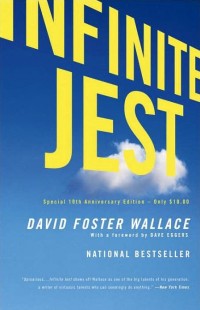 Infinite Jest
Infinite Jest
by David Foster Wallace
Little, Brown, 1996
1104 pages / $17.99 buy from Powell’s
1. David Foster Wallace was born in a small town in western Ohio, best known for its jar factory. This would figure in the book, Infinite Jest.
2. The first three pages of Infinite Jest are like a key to the novel. Without them you’ll probably be lost.
3. A palm tree is a recurring motif in the book, which seems to represent an opening and closing of the author’s heart.
4. DFW first wrote the manuscript to Infinite Jest when he was 22. He put it in a box that he carried from apartment to apartment as he studied at various schools or followed various women about the country.
5. By the third chapter, with the introduction of the character of the cabbie, you’ll probably feel confused and even ready to give up. Most people do right here.
6. Infinite Jest will seem like the driest book you’ve ever read. DFW needed to wring out the wet in literature.
7. A capable reader will read 22 pages at a time. Don’t worry if you aren’t capable. Most of us won’t be.
8. DFW refound the manuscript of Infinite Jest at age 33, when he was moving out of the house near Tulsa. He didn’t think much of it, apparently.
9. In a survey of college students, most readers found themselves skipping an average of 2 pages every 10.
10. At one point, the cabbie finds a note from his wife. This seems to represent a fracturing of the potency of language.
13. DFW lived in 7 cities, 2 towns, and a township in his brief life. This kind of movement is absent in Infinite Jest.
14. If you notice yourself feeling lost, reread the first three pages, especially the note on turmoil.
15. DFW wrote a very long treatise on suicide and its effects on his family.
16. At about page 222, you will notice a shift in tone towards the infinite.
17. The three stones seem to represent an overarching self-consciousness and a nervous disposition.
18. DFW read a passage from Infinite Jest at his brother’s funeral. Most of the family thought this was inappropriate even though the brother requested it.
21. If you’ve made it to page 389, statistically speaking, you will finish the book.
22. The palm trees lean in the Santa Ana winds. Those three pebbles are reconfigured.
23. This may be the best book you’ve ever read, just behind Moby Dick.
24. DFW thought that Infinite Jest was a failure, which, conversely, it largely was.
25. The last page of the book will be like a slowly turning knob. That’s the way DFW wanted it.
Tags: 25 Points, david foster wallace, Infinite Jest

DFW didn’t have a brother, did he?
Is this a review? Half of these are just like ‘most people will think this is hard’
I once worked for a certain small publisher (which, incidentally, was located at the same college where DFW taught) that had a very particular rule: Never call the books difficult, or anything to that effect—e.g., don’t call them “experimental.” The idea was to never say anything that gave readers permission to not read the books.
This is a review.
did you read Infinite Jest? half of these are making fun of the supposed ‘so difficult’ factor as well as the necessity of a guide, etc. the other half are hilarious. the other half are rhinestone cowboys.
Humor is lost on me, in general, as I have no soul.
I have read Infinite Jest, and yeah I didn’t find it so difficult. I guess I didn’t pick up on the alleged irony in this review. Also were there three halves to this? I didn’t notice that either
I think that’s a really great rule, even though I don’t think that ‘experimental’ always connotes difficulty. But yeah, saying a book is difficult both excuses people from reading it and also congratulates the person who does read it in a way that’s sorta repulsive and silly.
Most of these points are false.
4 notes on this “review” of Infinite Jest.
1. Cite. ( Palm Trees? Really!? Cite!!!)
2. You are spot on concerning the opening section of the book.
3. Re Stones, Slowly Turning Knob: offering us vague, metaphorical “keys” to the book really just misleads. A book whose central argument (s) concern not metaphor but entertainment, addiction and (ultimate) pleasure demands from an (dis)honest reviewer engagement on these fronts, instead of lapidary bromides.
4. Re Lapidary Bromides: They’re well put together, though :-)
I think cocteauorphan’s two “other hal[ves]” are the same “other half”: the “hilarious” half is the half constituted by “rhinestone cowboys”.
So “half” are “making fun”–I guess, not especially successfully, because the “other half” are “hilarious […] rhinestone cowboys”.
There being twenty-five “points”, “half” either a) is imprecise, or b) admits of at least one halved or mixed point that both “make[s] fun” and is “hilarious” alternately or simultaneously, respectively.
Or there was completion, wholeness, fulness at sixteen-and-two-thirds points, and another “half” (of eight-and-one-third points) was added to the review.
Not sure how a suggestion that a review in the voice and mode of its target is an “alleg[ation]” of “irony”.
Nope. This whole review is some of a joke. Really though, I feel like all it does is spread false information.
Really good job Joe.
I’m probably too dumb for this. Or maybe it’s just boring.
newest replica u-boat watches
25 Points: Infinite Jest | HTMLGIANT